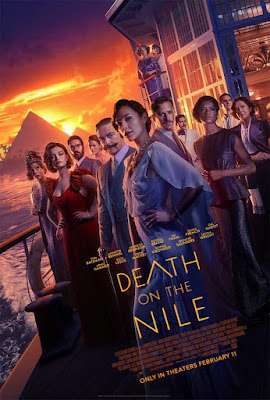The core of Christie's novel is intact in the film. Jacqueline de Bellefort (Emma Mackey) introduces her adoring fiancé Simon Doyle (Armie Hammer) to her close friend, the fabulously rich and beautiful Linnet Ridgeway (Gal Gadot). Six months later, it's Simon and Linnet who are honeymooning in Egypt with friends and family, and Jacqueline who crashes the party. Linnet engages the sympathy of detective Hercule Poirot (Branagh). Besides being rattled by her stalker, she confesses that she fears that everyone in the party hates her.
Though Christie's whodunnits have been criticized for being formulaic and shallow, I've found that she brings psychological and theological depth to her work. Poirot reminds Linnet of the Old Testament parable of the rich man who steals the poor man's ewe. Unlike King David, Linnet refuses to see herself in the story. But Poirot takes her fury at Jacqueline to be a sign that, deep down, Linnet knows that justice is on the side of her ex-friend. Then, confronting Jacqueline, Poirot urges her to use the power she has in this situation, to forgive. If not, he warns, the evil that you're allowing to grow will take you over. To both women, who each claim that they have no choice but to act as they do, Poirot says, "you do have a choice."
Branagh and Greene lop off parts of Christie's plot to focus on those relationships. Gone from the film are subplots that involve a secret agent, an alcoholic, a kleptomaniac, a jewel smuggler, a brutish engineer with a grudge, and three different romances that Poirot helps along as matchmaker.
What Branagh and Greene add is Poirot's backstory in a battle episode during the Great War. An explosion puts him in the hospital. Visited there by his fiancée Katherine, he tells her that he failed to save a close friend and that he is afraid to show her his own disfigurement. She delivers an intense sermonette on what love means that resonates throughout the movie, especially when the character Rosalie Otterbourne (Letitia Wright) accuses Poirot of self-absorption, arrogance, and inhuman coldness. Annette Bening's character Euphemia mocks the famous passage on love from 1 Corinthians 13, evidently from bitter experience with an ex-husband: "Love is NOT patient and kind...."
Branagh and Greene also alter Christie's original characters, combining some, reimagining others. The most inspired of these changes is to turn the character Salome Otterbourne from a dotty white English writer with a disapproving daughter to a canny black Blues singer with a disapproving daughter. A sexy dance between Jacqueline and Simon at Salome's jazz club sets the baseline for everything else that happens.
The film startles us more than once with shots of breathtaking beauty from the banks of the Nile, on it, and under it.
After I read the novel, I still wanted more and viewed Branagh's earlier Christie adaptation of Murder on the Orient Express. I've been a lifelong fan of the 1974 version, so I approached it with some skepticism; it won me over.
[See my blogpost of 10/2014 about Christ in Christie. I compare Orient Express, Finney's film version, Suchet's TV film version, and the novel. In this article, I apologize for underappreciating the richness of Christie's work. See also my page Crime fiction.]

No comments:
Post a Comment